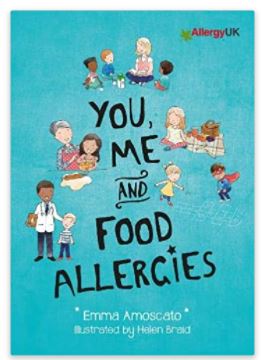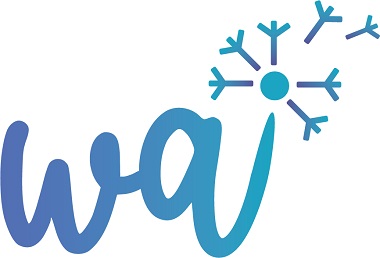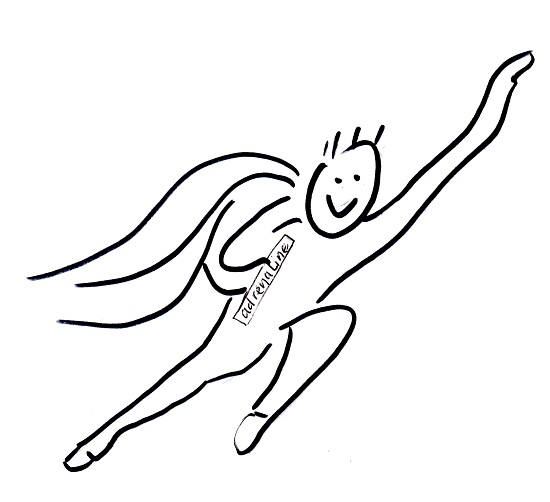This is a subject that comes up time and time again at the Allergy Support Group I organise with The Anaphylaxis Campaign and it’s not a simple answer.
Every child, mother and family is different and there are so many ways to approach this but here are a few that proved really helpful and positive:
- Tell them they’re special – Explain to them that their body is actually quite special and that it’s doing something very strange, and something doctors can’t quite explain, but that it sees peanuts or any other allergen as an invader and it needs to fight it to get it out. This is what happens when they get ill or have a scab or an infection, the white blood cells work like soldiers and race to the area that needs help or protection. In the case of someone with an allergy it’s getting the wrong signal about food that is really quite harmless. So for them, their trigger, whether it’s eggs, dairy, peanuts etc. is really like poison.
- Get an epipen training pen – Show them how to use their Epipen. Explain how it works, that it’s a bit like an antidote to the poison if they eat something and have an allergic reaction. Teach them when they should use it, what the signals are etc. and make sure they are confident. You never know when they might have to do it themselves or how panicked you might be. Kids can be surprisingly resilient and calm in the face of danger.
- Teach them what’s safe – You will choose alternative brands and foods that are safe for your child. Teach them that Alpro, Rice Dream of LactoFree are the safe milks for instance and show them the packaging. Get them to help you when shopping to find the products they can eat. This way they will learn to question what other people give them, sometimes adults and other kids make a mistake and may think something is OK. By teaching them what’s safe they will recognise if something looks different to what they’re use to.
- Encourage them to question – All kids ask questions, but an allergy kid needs to question even more. They need to constantly be checking, asking and questioning whether food, situations and circumstances are really safe.
- This is serious, but not that scary – Allergies can be life threatening but this concept can be hard to grasp for kids and you don’t want to frighten them. What you do want them to realise is that nuts or dairy or whatever they are allergic to will make them very ill and that they will probably have to go the hospital. If they have had an anaphylactic reaction the chances are they will not want it to happen again and may well be very scared that it might, and this is serious stuff so that’s not such a bad thing. Not that they had an attack – but they know it’s a serious threat. Siblings can also be really supportive and if older, also help to look out for the allergic child and keep them safe.
- Spot the danger – you could even play a game for points, stars or treats that are not food related, to try to spot potential allergy dangers when you go out. When you’re with your child you are their eyes and can do this for them, but ultimately you want them to be able to take over this role and be responsible one day. You can’t protect them forever but you can help them to stay safe and learn how to be constant checking, questioner, asker, assessor etc. of EVERY situation.
Safety begins at home
Your home should be a completely safe place for your child. If you can ensure that your child’s trigger allergen is never in the house and the whole family eats free from peanuts of sesame this is obviously the safest option.
However, if you have other kids without an allergy you may want to take a more flexible approach. Have a ‘safe box’ with all the treats for your allergic child. Make sure your other kids are fully aware of the seriousness of living with someone with a life threatening allergy and teach them all about cross contamination and careful storage. If foods are prepared using eggs, wheat or dairy for instance, these should be stored safely too, in a sealed container and clearly marked, so the child with the allergy knows not to touch them.
Going out, the dreaded big wide world
When your child goes to friend’s houses, school and other places outside your home they need to be able to learn how to cope, recognise dangerous situations and work out how to cope. In the first instance, when they’re young, making sure they ask you before eating anything to check it’s safe is the first thing to drum into them.
When you’re there you can make sure it’s OK but you can’t watch them every second of every day. There could be traces of peanut butter on the play area for instance, or toddlers could pick up anything and put it into their mouths. Very frightening to try and keep your baby safe when they’re so little.
- Stick to places you do know are safe, which to start off with might not be that many places, but you will find some.
- Take wet wipes with you and clean down any eating areas before sitting down.
- Clean the arms of seats etc.
- Clean toys if you think they might have food on them.
- Find other allergy mums and organise days out with them.
- Speak to the school.
- If you’re struggling to find someone to talk to do ring up Allergy UK or The Anaphylaxis Campaign who also both have lots of useful hand outs and advice for those bringing up small kids with allergies.
- The Anaphylaxis Campaign also run lots of seminars and open days where you’ll also get to meet other parents of allergic kids so get involved.
- If you use social media there are also loads of allergy groups you can get involved with, ask questions, share problems etc.
Get support and don’t get too stressed
A recent study showed that the mothers of allergic child were at a very high risk of suffering stress and depression because they race around making life as normal as possible for their allergic child taking all the stress and worry on their back and not having anyone to talk to or help them do this.
You are not alone, there are other mums and dads out there trying to cope just like you. Don’t let it get overwhelming. Find someone you can talk to, even if initially, it’s just online. Tell your doctor how hard you’re finding it. Don’t suffer in silence. One very active Facebook group which is American is No Nuts Moms. If you use Facebook it’s worth a look and search for other groups, but more importantly, find some real people who understand too.
Further reading:
Also get Emma’s book, You me and Food Allergies, available on Amazon.













Really helpful Ruth – will put a link to your suggestions from the FoodsMatter site.
Thans Michelle – not ever so easy when you don’t have kids, but forced to address this with forthcoming Support Group coming up. I’ve learnt so much from the Mums in the group. I can understand why my mum was so annoying about the nut allergy now and she didn’t even know then what was happening to me, we didn’t have an EpiPen or anything. A mother knows when something is very wrong though!
Nice post Ruth, my daughter was two when we found out about her allergy. I used to go nut spotting in the supermarket down the biscuit isles and health food isles so she recognised the sort of foods to avoid. Sounds like I was doing something right.
She has a really small choice of foods she’ll eat now that we think is her defense mechanism to ensure she knows what she is eating. Even at 10 years old she isn’t very adventurous.
I love a bit of ‘nut spotting’. You get very adept at spotting them at parties and then begin the dance of avoiding a ‘nutty kiss’ from a nut guzzling friend. It’s not easy avoiding nuts. I don’t blame your daughter for being cautious but I hope she’s not missing out on stuff and it is a shame, I am just the same, eating out is not the hedonistic indulgent experience it is for most people. If I’m honest it’s not much fun at all and a jolly good job I like steak and stern talks with chefs. How can you help her challenge her pallate and try new foods? Maybe you could cook some home made meals with different foods to get her excited about food again and expand her choices? I’ve never heard of the Biscuit Isles – they sound amazing! Where are they? (sorry, copywriter, couldn’t resist)
Thanks Ruth, some really nice ideas here. Now that ‘Baby’ is a toddler, when we are out, she now asks me if food is dairy free. She knows she can drink coconut milk and ‘Giraffe Milk’ (Alpro Junior version) but it would sound really weird if someone not in ‘the know’ was to hear her say that!
Do giraffe’s have milk? I guess they must do. Kids are so funny.
Hi Ruth
This is a great piece. I am sure lots of the visitors to http://www.lunchboxdoctor.com would really benefit from having access to this. I actually think it is also really useful for parents of non-allergic children to explain to their kids about children at school who may be allergic. There’s a lot of misunderstanding hence your post earlier this week on Facebook about people joking with you about food allergy. I hope you’d like to come and blog on the Lunchbox Doctor site. It would be well received.
Jenny T
Looking forward to blogging on the Lunchbox Doctor. Am working on tweaking this after the Support Group which may unearth some more new and clever ways of coping. I’ll be in touch and thanks for the kind words and comment!
Hi Ruth,
Great post, and thanks for highlighting these issues. Most people have no idea of the impact of allergies on family life. One comment I’d like to add is that as a parent of a son with anaphylaxis it’s really hard explaining to your child that it’s serious but not scary…it is scary and children will pick up on their parents anxiety. My son had a panic attack after one allergic reaction when he was 10 years old. The one thing which really helped was teaching him how to manage his allergy himself, what to look for, all the names which applied to his allergens, how to use his Epipen how to carry it himself etc…This gave some of the control to him and gave him confidence that he could manage this… It worked, he’s still severely allergic but 26 years old now and travels extensivley with work and leisure and just gets on with it.
Thanks Sue, yes I think honesty is the best strategy. I’m all grown up now and it still scares me so it must be very daunting for a small child. Really great advice and having a fun EpiPen carrier so the child can learn, when they’re old enough, how to look after theirs and how important it is to carry it with them at all times. Your sounds pretty cool, I’m way to scared to travel much. Am just getting braver in the UK but self catering isn’t always so much of a holiday when you still have to cook every night!
Hi there! This is a great post! Our daughter has a cmpa, diagnosed at about 9 months, an egg allergy, now grown out of, and coeliac disease. My advice would be to be very matter of fact about their situation…not to make a big thing of it. They need to know what to avoid and to question things but my advice would be to not make a drama out of it! There are worse things to have! Stay positive and if you ever need help with recipes, or want tips and information then check out my blog…freefromfairy.co.uk. The Intolerant Gourmet is also an amazing resource…far better than me! Google her…
Thanks for the comment. I’ve never seen those two books but it’s a great idea, and I guess makes them feel they are not the only ones. Finding some other kids with allergies to mix with also mean you can share some of the load, anxiety and pressure and go out with people who eat the same stuff, so other dangerous treats are not under your nose like a taunt all the time. Good luck with everything and keep in touch.